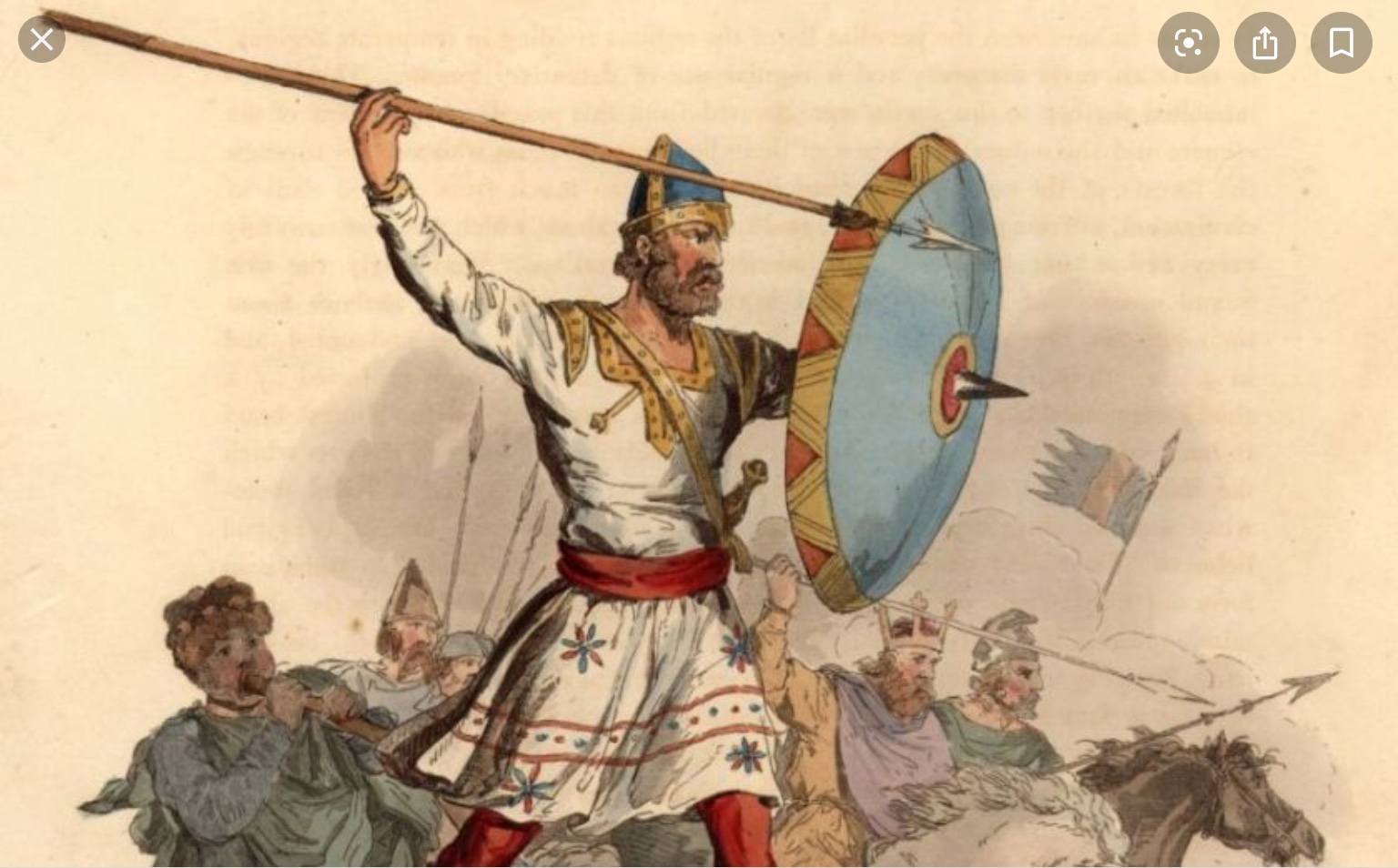
BBC Bitesize - History - How was Anglo-Saxon Britain ruled?
Assessment
•

Miras Howell
•
3rd - 4th Grade
•
37 plays
•
Medium
Improve your activity
Higher order questions
Match
•
Reorder
•
Categorization
.svg)
actions
Add similar questions
Add answer explanations
Translate quiz
Tag questions with standards
More options
7 questions
Show answers
1.
Multiple Choice

Question
Who generally ruled Anglo-Saxon Britain?
Text
Anglo-Saxon Britain wasn't ruled by one person and the Anglo-Saxons were not united. They invaded as many different tribes and each took over different parts of Britain.
Each group of Anglo-Saxon settlers had a leader or war-chief. A strong and successful leader became 'cyning', the Anglo-Saxon word for 'king'. Each king ruled a kingdom and led a small army.
From time to time, the strongest king would claim to be 'bretwalda', which meant ruler of all Britain.
Did they have laws?
The Anglo-Saxons didn't have prisons. People found guilty of crimes were either executed or punished with fines.
If they ran away, they became 'outlaws' (outside the law), and anyone could hunt them down - unless they hid in a church. The fine for breaking into someone's home was five shillings (25p), paid to the home-owner. For minor crimes like stealing, a nose or a hand might be cut off.
The Saxons had a system called 'weregild', which meant that if you injured someone, you had to pay for the damage!
If a person killed someone, they paid money to the dead person's relatives. The idea was to stop long fights or 'blood feuds' between families by making them pay money instead.
What happened when the Vikings invaded?
Anglo-Saxon history tells of many Viking raids. The first Viking raid recorded in the Anglo-Saxon Chronicle was around AD787. It was the start of a fierce struggle between the Anglo-Saxons and the Vikings.
Over time the Vikings took control of several Anglo-Saxon kingdoms. Eventually the Anglo-Saxons and Vikings made a peace agreement, but the fighting continued for many years.
The Vikings and Anglo-Saxons divided up Britain with the Anglo-Saxons living mainly in the west and the Vikings in an area to the east, known as the Danelaw.
A king
A war-chief
A cyning
Different tribes and kings
2.
Multiple Choice

Question
What does the Anglo-Saxon word ‘cyning’ mean?
Text
Anglo-Saxon Britain wasn't ruled by one person and the Anglo-Saxons were not united. They invaded as many different tribes and each took over different parts of Britain.
Each group of Anglo-Saxon settlers had a leader or war-chief. A strong and successful leader became 'cyning', the Anglo-Saxon word for 'king'. Each king ruled a kingdom and led a small army.
From time to time, the strongest king would claim to be 'bretwalda', which meant ruler of all Britain.
Did they have laws?
The Anglo-Saxons didn't have prisons. People found guilty of crimes were either executed or punished with fines.
If they ran away, they became 'outlaws' (outside the law), and anyone could hunt them down - unless they hid in a church. The fine for breaking into someone's home was five shillings (25p), paid to the home-owner. For minor crimes like stealing, a nose or a hand might be cut off.
The Saxons had a system called 'weregild', which meant that if you injured someone, you had to pay for the damage!
If a person killed someone, they paid money to the dead person's relatives. The idea was to stop long fights or 'blood feuds' between families by making them pay money instead.
What happened when the Vikings invaded?
Anglo-Saxon history tells of many Viking raids. The first Viking raid recorded in the Anglo-Saxon Chronicle was around AD787. It was the start of a fierce struggle between the Anglo-Saxons and the Vikings.
Over time the Vikings took control of several Anglo-Saxon kingdoms. Eventually the Anglo-Saxons and Vikings made a peace agreement, but the fighting continued for many years.
The Vikings and Anglo-Saxons divided up Britain with the Anglo-Saxons living mainly in the west and the Vikings in an area to the east, known as the Danelaw.
king
war-chief
tribe
settler
3.
Multiple Choice

Question
What does the Anglo-Saxon word ‘bretwalda’ mean?
Text
Anglo-Saxon Britain wasn't ruled by one person and the Anglo-Saxons were not united. They invaded as many different tribes and each took over different parts of Britain.
Each group of Anglo-Saxon settlers had a leader or war-chief. A strong and successful leader became 'cyning', the Anglo-Saxon word for 'king'. Each king ruled a kingdom and led a small army.
From time to time, the strongest king would claim to be 'bretwalda', which meant ruler of all Britain.
Did they have laws?
The Anglo-Saxons didn't have prisons. People found guilty of crimes were either executed or punished with fines.
If they ran away, they became 'outlaws' (outside the law), and anyone could hunt them down - unless they hid in a church. The fine for breaking into someone's home was five shillings (25p), paid to the home-owner. For minor crimes like stealing, a nose or a hand might be cut off.
The Saxons had a system called 'weregild', which meant that if you injured someone, you had to pay for the damage!
If a person killed someone, they paid money to the dead person's relatives. The idea was to stop long fights or 'blood feuds' between families by making them pay money instead.
What happened when the Vikings invaded?
Anglo-Saxon history tells of many Viking raids. The first Viking raid recorded in the Anglo-Saxon Chronicle was around AD787. It was the start of a fierce struggle between the Anglo-Saxons and the Vikings.
Over time the Vikings took control of several Anglo-Saxon kingdoms. Eventually the Anglo-Saxons and Vikings made a peace agreement, but the fighting continued for many years.
The Vikings and Anglo-Saxons divided up Britain with the Anglo-Saxons living mainly in the west and the Vikings in an area to the east, known as the Danelaw.
ruler of a small kingdom
war-chief of a large kingdom
ruler of all Britain
king of Europe
4.
Multiple Select

Question
What happened to criminals in Anglo-Saxon Britain? Select all that apply.
Text
Anglo-Saxon Britain wasn't ruled by one person and the Anglo-Saxons were not united. They invaded as many different tribes and each took over different parts of Britain.
Each group of Anglo-Saxon settlers had a leader or war-chief. A strong and successful leader became 'cyning', the Anglo-Saxon word for 'king'. Each king ruled a kingdom and led a small army.
From time to time, the strongest king would claim to be 'bretwalda', which meant ruler of all Britain.
Did they have laws?
The Anglo-Saxons didn't have prisons. People found guilty of crimes were either executed or punished with fines.
If they ran away, they became 'outlaws' (outside the law), and anyone could hunt them down - unless they hid in a church. The fine for breaking into someone's home was five shillings (25p), paid to the home-owner. For minor crimes like stealing, a nose or a hand might be cut off.
The Saxons had a system called 'weregild', which meant that if you injured someone, you had to pay for the damage!
If a person killed someone, they paid money to the dead person's relatives. The idea was to stop long fights or 'blood feuds' between families by making them pay money instead.
What happened when the Vikings invaded?
Anglo-Saxon history tells of many Viking raids. The first Viking raid recorded in the Anglo-Saxon Chronicle was around AD787. It was the start of a fierce struggle between the Anglo-Saxons and the Vikings.
Over time the Vikings took control of several Anglo-Saxon kingdoms. Eventually the Anglo-Saxons and Vikings made a peace agreement, but the fighting continued for many years.
The Vikings and Anglo-Saxons divided up Britain with the Anglo-Saxons living mainly in the west and the Vikings in an area to the east, known as the Danelaw.
They went to jail.
They became outlaws.
They were executed
They had to pay fines
5.
Multiple Choice

Question
What was the punishment for breaking into someone’s house in Anglo-Saxon Britain?
Text
Anglo-Saxon Britain wasn't ruled by one person and the Anglo-Saxons were not united. They invaded as many different tribes and each took over different parts of Britain.
Each group of Anglo-Saxon settlers had a leader or war-chief. A strong and successful leader became 'cyning', the Anglo-Saxon word for 'king'. Each king ruled a kingdom and led a small army.
From time to time, the strongest king would claim to be 'bretwalda', which meant ruler of all Britain.
Did they have laws?
The Anglo-Saxons didn't have prisons. People found guilty of crimes were either executed or punished with fines.
If they ran away, they became 'outlaws' (outside the law), and anyone could hunt them down - unless they hid in a church. The fine for breaking into someone's home was five shillings (25p), paid to the home-owner. For minor crimes like stealing, a nose or a hand might be cut off.
The Saxons had a system called 'weregild', which meant that if you injured someone, you had to pay for the damage!
If a person killed someone, they paid money to the dead person's relatives. The idea was to stop long fights or 'blood feuds' between families by making them pay money instead.
What happened when the Vikings invaded?
Anglo-Saxon history tells of many Viking raids. The first Viking raid recorded in the Anglo-Saxon Chronicle was around AD787. It was the start of a fierce struggle between the Anglo-Saxons and the Vikings.
Over time the Vikings took control of several Anglo-Saxon kingdoms. Eventually the Anglo-Saxons and Vikings made a peace agreement, but the fighting continued for many years.
The Vikings and Anglo-Saxons divided up Britain with the Anglo-Saxons living mainly in the west and the Vikings in an area to the east, known as the Danelaw.
Jail
Death
A fine of 25p
Hand cut off
6.
Multiple Choice

Question
When was the first recorded Viking raid in Anglo-Saxon Britain?
Text
Anglo-Saxon Britain wasn't ruled by one person and the Anglo-Saxons were not united. They invaded as many different tribes and each took over different parts of Britain.
Each group of Anglo-Saxon settlers had a leader or war-chief. A strong and successful leader became 'cyning', the Anglo-Saxon word for 'king'. Each king ruled a kingdom and led a small army.
From time to time, the strongest king would claim to be 'bretwalda', which meant ruler of all Britain.
Did they have laws?
The Anglo-Saxons didn't have prisons. People found guilty of crimes were either executed or punished with fines.
If they ran away, they became 'outlaws' (outside the law), and anyone could hunt them down - unless they hid in a church. The fine for breaking into someone's home was five shillings (25p), paid to the home-owner. For minor crimes like stealing, a nose or a hand might be cut off.
The Saxons had a system called 'weregild', which meant that if you injured someone, you had to pay for the damage!
If a person killed someone, they paid money to the dead person's relatives. The idea was to stop long fights or 'blood feuds' between families by making them pay money instead.
What happened when the Vikings invaded?
Anglo-Saxon history tells of many Viking raids. The first Viking raid recorded in the Anglo-Saxon Chronicle was around AD787. It was the start of a fierce struggle between the Anglo-Saxons and the Vikings.
Over time the Vikings took control of several Anglo-Saxon kingdoms. Eventually the Anglo-Saxons and Vikings made a peace agreement, but the fighting continued for many years.
The Vikings and Anglo-Saxons divided up Britain with the Anglo-Saxons living mainly in the west and the Vikings in an area to the east, known as the Danelaw.
787BC
AD787
AD878
AD877

Explore this activity with a free account
Find a similar activity
Create activity tailored to your needs using
.svg)

Beginning Sound
•
KG

Presidents Of The Philippines
•
KG

Past Tense and Past Perfect Tense
•
7th Grade

Factoring
•
8th Grade

Comparing Numbers
•
1st Grade

Presence or Absence of Oxygen
•
KG

Math Vocab
•
KG

Java Variables
•
KG